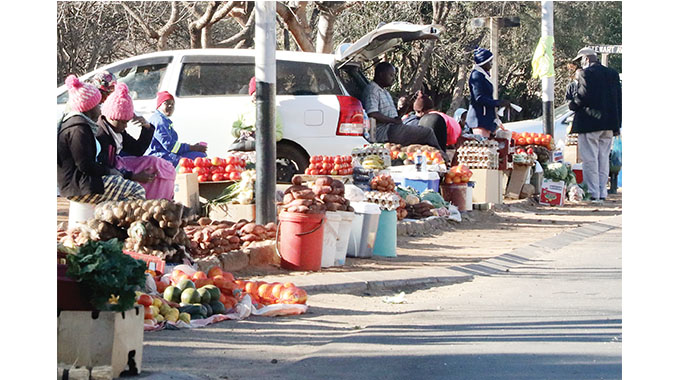Vendors count lockdown losses

Sukulwenkosi Dube-Matutu, Gwanda Correspondent
EIGHTY-year-old Mrs Rachael Sibanda from Gwanda has been a vendor in the town’s centre for the past 11 years.
The income she has been earning helped her to put her two children through tertiary education. Mrs Sibanda is now shattered as her business is slowly collapsing due to the effects of the Covid-19 induced lockdown.
Before the Covid-19 pandemic, Mrs Sibanda used to sell a wide variety of farm produce. All she has now are two small winnowing baskets with groundnuts, roundnuts and sugar beans as she does not have money to buy stock.
“I used to have a wide variety of stock. I used to sell onions, tomatoes, potatoes, sweet potatoes, vegetables, fruits, cabbages, matemba, ground nuts, roundnuts and sugar beans among other products. When we were advised to suspend our operations at the onset of the lockdown I took my wares home. As the lockdown dragged on, we slowly started to eat the products,” she said.
“Some of my neighbours used to come and buy from my house but it was rare. Eventually my entire stock was gone. When we were told to resume operations, I had little money and I was only able to buy these little wares that I have. I don’t even have money to buy a vending stall which costs R350.”
Mrs Sibanda said she did not get the Covid-19 relief grant which was given to small and mid-size enterprises (SMEs) by Government. She said conducting business was going to be more difficult now that they had been relocated to a place that is not frequented by people.
“For the past 11 years I have been selling by the road where we used to operate from before we were relocated. Our new place is really a challenge because it’s not as visible as the old one. Since we started operating from this new location, we hardly have customers coming by.
After I knock off, I have to move from house to house try to sell my products,” she said.
Ms Dorothy Ncube (62) who is also a vendor operating at Bambanani Market said on some days, she does not go to the market as she would not be having any stock.
She said at the moment she just sells vegetables including tomatoes and groundnuts and some customers were now shunning their market due to lack of variety.
“If customers are going to arrive and see that I only have tomatoes and onions and I don’t have potatoes and cabbages they opt to go to a market that has all the products they need. Before the lockdown I had a wide range of farm produce products and I was always on my feet as people were constantly buying or passing by to inquire prices.
“Being a vendor is my main source of livelihood and if my business collapses it will mean I won’t manage to put food on the table,” she said.
The chairperson of Gwanda Urban Chamber of SMEs representing the informal sector, Mr Michael Ndlovu said vendors were allocated new working space but only a few vendors were operating from the place as some did not have money to re-stock after the disruption caused by Covid-19.
Mr Ndlovu said some were now resorting to selling from their homes in order to avoid paying rentals to council. He appealed to various stakeholders to assist vendors with a cash injection to help save their ailing businesses.
“Before the lockdown the town was buzzing with activities from vendors. There were three working points which were all very busy. Now we are failing to fill up just one vending site. Sometimes the vendors come while on other days they don’t,” he said.
“The main reason is that people don’t have money to buy stock while a few have pointed out that the vending site isn’t visible enough to customers. Others are trying to avoid paying rentals because they are struggling to keep their businesses afloat. Some vendors received the $600 Covid-19 relief grant but it didn’t make much of a difference.” -@DubeMatutu











Comments